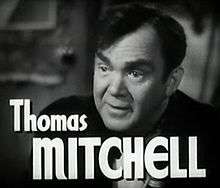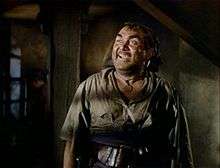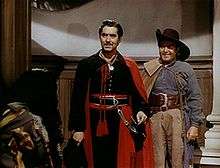Thomas Mitchell (actor)
| Thomas Mitchell | |
|---|---|
 from the trailer for High Barbaree (1947) | |
| Born |
Thomas John Mitchell July 11, 1892 Elizabeth, New Jersey, USA |
| Died |
December 17, 1962 (aged 70) Beverly Hills, California, USA |
| Resting place | Chapel of the Pines Crematory |
| Occupation | Actor, director, playwright, screenwriter |
| Years active | 1916–62 |
| Spouse(s) |
Rachel Hartzell (1937–1939) Ann Stuart Breswer (1941–1962; his death) |
Thomas John Mitchell (July 11, 1892 – December 17, 1962) was an American actor. Among his most famous roles in a long career are those of Gerald O'Hara, Scarlett's father in Gone with the Wind, the drunken Doc Boone in John Ford's Stagecoach, and Uncle Billy in It's a Wonderful Life. Mitchell was the first male actor to win an Oscar, an Emmy, and a Tony Award.
Nominated twice for an Oscar, first for The Hurricane (1938), he won the Best Supporting Actor award for Stagecoach (1939); later, he would be nominated three times for an Emmy Award. He was nominated twice, in 1952 and 1953, for his role in the medical drama The Doctor, winning the Lead Actor Drama award in 1953. Nominated again in 1955, for an appearance on a weekly anthology series, he did not win. Mitchell won the Tony for Best Actor in a Musical, in 1953, for his role as Dr Downer in the musical comedy Hazel Flagg, based on the 1937 Paramount comedy film Nothing Sacred, rounding out the Triple Crown of acting awards. In addition to being an actor, he was also a director, playwright, and screenwriter.
Early life
Mitchell was born to Irish immigrants in Elizabeth, New Jersey. He came from a family of journalists and civic leaders. Both his father and brother were newspaper reporters, and his nephew, James P. Mitchell, later served as Dwight Eisenhower's Secretary of Labor.[1] The younger Mitchell also became a newspaper reporter after graduating from St. Patrick High School in Elizabeth. However, Mitchell soon found that he enjoyed writing comic theatrical skits much more than chasing late-breaking scoops. In 1927 Mitchell joined The Lambs.[2]
Acting career
He became an actor in 1913, at one point touring with Charles Coburn's Shakespeare Company. Even while playing leading roles on Broadway into the 1920s Mitchell would continue to write. One of the plays he co-authored, Little Accident, was eventually made into a film (three times) by Hollywood. Mitchell's first credited screen role was in the 1923 film Six Cylinder Love.

Mitchell's breakthrough role was as the embezzler in Frank Capra's film Lost Horizon (1937).
Following this performance, he was much in demand in Hollywood.[3] That same year, he was nominated for a Best Supporting Actor Academy Award for his performance in The Hurricane, directed by John Ford.
Over the next few years, Mitchell appeared in many significant films. Forty-three of the fifty-nine films in which he acted, were made in the 10-year period from 1936-1946. In 1939 alone he had key roles in Stagecoach, Mr. Smith Goes to Washington, Only Angels Have Wings, The Hunchback of Notre Dame, and Gone with the Wind. While probably better remembered as Scarlett O'Hara's loving but doomed father in Gone with the Wind, it was for his performance as the drunken Doc Boone in Stagecoach, co-starring John Wayne (in Wayne's breakthrough role), that Mitchell won the Best Supporting Actor Academy Award. In his acceptance speech, he quipped, "I didn't know I was that good". Throughout the 1940s and 1950s, Mitchell acted in a wide variety of roles in productions such as 1940's Swiss Family Robinson, 1942's Moontide, 1944's The Keys of the Kingdom (as an atheist doctor) and High Noon (1952) as the town mayor. He is probably best known to audiences today for his role as sad sack Uncle Billy in Capra's Christmas classic It's a Wonderful Life (1946) with James Stewart.

From the 1950s and into the early 1960s, Mitchell worked primarily in television, appearing in a variety of roles in some of the most well-regarded early series of the era, including Playhouse 90, Dick Powell's Zane Grey Theater (in a pilot episode that became the CBS series Johnny Ringo), and Hallmark Hall of Fame productions. In 1954, he starred in the television version of the radio program, Mayor of the Town. In 1955, he played Kris Kringle in The 20th Century-Fox Hour version of The Miracle on 34th Street opposite Teresa Wright and MacDonald Carey. In 1959, he starred in thirty-nine episodes of the syndicated television series, Glencannon, which had aired two years earlier in the United Kingdom.
In the early 1960s, Mitchell originated the stage role "Columbo", later made famous on NBC and ABC television by Peter Falk (Bert Freed played the part on live television before Mitchell portrayed Columbo on stage); Columbo was Mitchell's last role.
Death
Mitchell died at the age of seventy from peritoneal mesothelioma in Beverly Hills, California.
Awards and honors
In 1953, Mitchell became the first person to win the "triple crown" of acting awards (Oscar, Emmy, Tony). He remains one of only a handful of individuals to have won each of these awards. He won the Academy Award for Best Supporting Actor for 1939's Stagecoach. In 1952, he won the Best Actor Emmy (Comedy Actor category), and the following year a Tony Award for best performance by an actor, for the musical Hazel Flagg (based on the Carole Lombard film Nothing Sacred). He has two stars on the Hollywood Walk of Fame, one for his work in television at 6100 Hollywood Boulevard, and a second star for his work in motion pictures at 1651 Vine Street[4] making him one of fewer than a hundred Oscar-winning male actors in Hollywood history to receive a motion pictures star.
Filmography
As actor
- Six Cylinder Love (1923) (film debut)
- Craig's Wife (1936)
- Theodora Goes Wild (1936)
- When You're in Love (1937)
- Lost Horizon (1937)
- Make Way for Tomorrow (1937)
- The Hurricane (1937)
- I Promise to Pay (1937)
- Trade Winds (1938)
- Love, Honor and Behave (1938)
- Stagecoach (1939)
- Only Angels Have Wings (1939)
- Mr. Smith Goes to Washington (1939)
- Gone with the Wind (1939)
- The Hunchback of Notre Dame (1939)
- Swiss Family Robinson (1940)
- Our Town (1940)
- Angels Over Broadway (1940)
- The Long Voyage Home (1940)
- Three Cheers for the Irish (1940)
- Out of the Fog (1941)
- Flight from Destiny (1941)
- The Devil and Daniel Webster (1941) (scenes cut)
- Joan of Paris (1942)
- Moontide (1942)
- This Above All (1942)
- Tales of Manhattan (1942)
- The Black Swan (1942)
- Song of the Islands (1942)
- Immortal Sergeant (1943)
- The Outlaw (1943)
- Bataan (1943)
- Flesh and Fantasy (1943)
- The Fighting Sullivans (1944)
- Buffalo Bill (1944)
- Wilson (1944)
- Dark Waters (1944)
- The Keys of the Kingdom (1944)
- Adventure (1945)
- Captain Eddie (1945)
- Within These Walls (1945)
- Three Wise Fools (1946)
- The Dark Mirror (1946)
- It's a Wonderful Life (1946)
- High Barbaree (1947)
- The Romance of Rosy Ridge (1947)
- Silver River (1948)
- Alias Nick Beal (1949)
- The Big Wheel (1949)
- Journey Into Light (1951)
- High Noon (1952)
- Destry (1954)
- Secret of the Incas (1954)
- Miracle on 34th Street (TV adaptation) (1955)
- While the City Sleeps (1956)
- Handle With Care (1958)
- Too Young to Love (1959)
- Pocketful of Miracles (1961)
- By Love Possessed (1961)
As writer
- Little Accident (1928 - play, Little Accident)
- Papa Sans le Savoir (1932 - play, Little Accident)
- All of Me (1934; screenplay)
- Life Begins with Love (1937; screenplay)
- Little Accident (1939 - play, Little Accident)
- Casanova Brown (1944)
Radio appearances
| Year | Program | Episode/source |
|---|---|---|
| 1953 | Theatre Guild on the Air | A Square Peg[5] |
References
- ↑ Life. October 19, 1953. "Labor gets a new secretary". p. 56.
- ↑ http://www.the-lambs.org
- ↑ Monush, Barry. Hal Leonard Corporation. (2003). ISBN 1-55783-551-9. p. The Encyclopedia of Hollywood Film Actors: From the silent era to 1965. p. 509.
- ↑ "Walk of Fame Stars-Thomas Mitchell". Hollywood Chamber of Commerce. Archived from the original on April 3, 2016. Retrieved October 13, 2016.
- ↑ Kirby, Walter (March 15, 1953). "Better Radio Programs for the Week". The Decatur Daily Review. p. 46. Retrieved June 25, 2015 – via Newspapers.com.

External links
| Wikimedia Commons has media related to: |
- Thomas Mitchell at the Internet Movie Database
- Thomas Mitchell at the Internet Broadway Database

- Thomas Mitchell at Find a Grave
- Photos of Thomas Mitchell from 'Stagecoach' by Ned Scott